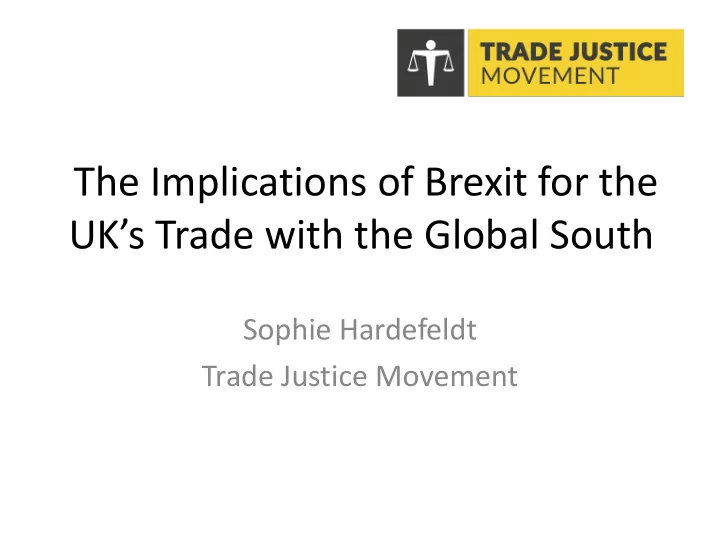

The Implications of Brexit for the UK’s Trade with the Global South Sophie Hardefeldt Trade Justice Movement
Why is International Trade important? – Rise of free trade since the end of WWII – Expansion of trade agreements from agreements that govern trade of goods between countries to 21 st century agreements that impact on almost all sectors of the economy – 21 st century agreements undermine hard fought labour, environment and human rights standards by shifting the power in favour of corporations and challenging governments’ ability to regulate.
Impacts of Free Trade • Bangladesh’s garment industry – US$28.1 billion worth of goods exported in 2016 – Employs 4 million people – But, widespread exploitation and workers don’t even earn a living wage • United Nations Economic Commission for Africa found that in spite of recent improvements in economic growth most African economies are still heavily dependent on commodity production and exports, which means that this growth has not been translated into economic diversification, increases in jobs or faster social development.
How will Brexit impact the Global South? • Fall in the value of the pound will reduce UK aid and remittance flows from the UK to Southern Countries • As the UK regains responsibility for its trade policy it will need to develop new trade arrangements with Southern countries.
How will Brexit impact the Global South? • The UK Government announced in June that it would ensure stability for by translating the EU arrangements with Southern countries into UK law. • It also committed to exploring options to expand these relationships.
Market Access Schemes • Everything But Arms • The Generalised Scheme of Preferences • Together these two schemes save LDC exporters €385 million per year, non -LDC African, Caribbean and Pacific exporters €205 million and Commonwealth exporters €715 million.
Economic Partnership Agreements • Tanzania’s foreign affairs permanent secretary Aziz Mlim said the EPAs “will not benefit local industries in east Africa. Instead it will lead to their destruction as developed countries are likely to dominate the market. ” • Frank Jacobs, the President of Manufacturers Association of Nigeria, said that the EPA’s would “further de -industrialise the region and would have catastrophic implications on employment generation thereby worsening the poverty situation
Bilateral Investment Treaties • Supposedly designed to promote investment flows and protect international investors and their investments. • Contain investor to state dispute settlement clauses • Over the last 15 years, non-OECD countries have faced $415 billion in claims against them.
Priorities for Trade Policy Reform • Ensure democracy and transparency in the negotiation and ratification of trade agreements • Watch a video produced by Sum of Us about the impacts of Brexit https://www.facebook.com/SumOfUsOrg/videos/1298903113529019/ • Visit Global Justice Now’s website and sign their petition http://www.globaljustice.org.uk/how-make-trade-deals-more- democratic • Follow TJM on twitter – to find out more about campaign activities. TradeJusticeMov
Priorities for Trade Policy Reform • Expand market access for Southern Countries – Expand Everything but arms to all Southern Countries – Expand the products that are included in the Generalised Scheme of Preferences – Increase the amount that UK tariffs are reduced so that Southern countries can benefit more from trade with UK
Building a new approach to International Trade • As the UK develops it’s new trade policy we need to remember • Free trade is not the only way we can trade with other countries • The UK can choose to develop trade policy that aims to improve living standards, reduce poverty and facilitate the transition to a sustainable economy.
Recommend
More recommend